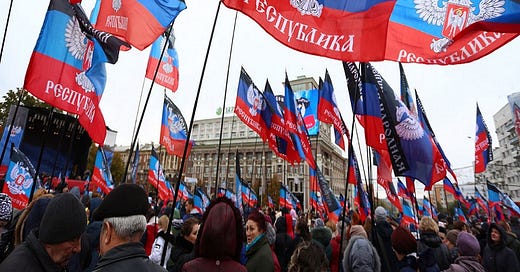The Mandatory Evacuation From Kiev-Controlled Donbass Implies Impending Territorial Losses
It would be delusional to deny that the mandatory evacuation from the rest of Kiev-controlled Donbass isn’t a major setback for that side’s cause. This wasn’t supposed to happen, let alone after the delivery of much-ballyhooed Western weapons like the HIMARS.
Zelensky just declared a mandatory evacuation from Kiev-controlled Donbass ahead of the upcoming winter, which he claims will be fully subsidized by the state. This development very strongly implies that this crumbling former Soviet Republic expects further territorial losses, yet this is the first time that he’s demanded that the people under its writ leave their homes ahead of time. Up until this point, Kiev exploited them as de facto human shields by militarizing residential areas in order to slow the Russian and allied advance, so it shouldn’t be taken for granted that Zelensky is serious about his mandatory evacuation order. That said, there are two arguments for why he might actually go through with it.
First, the innumerable war crimes accusations that have plagued his forces over the past five months are contributing to so-called “Western fatigue” and even growing suspicion about the supposed righteousness of his side’s cause. By dramatically declaring the mandatory evacuation of all remaining people in Kiev-controlled Donbass, the Ukrainian leader might be trying to generate positive media coverage that’ll focus on his supposed “humanitarian credentials” while simultaneously serving to distract from his forces’ war crimes accusations as well as their latest spree of losses over the summer. In other words, this might just be a public relations operation first and foremost.
Second, in a more practical sense, it might also be meant to deprive the Donetsk People’s Republic (DPR) of some demographic strength upon the full liberation of its territory. Kiev’s forces have been on the backfoot this entire time so it wouldn’t be far-fetched for Zelensky to want to evacuate the population far behind government lines in the hopes of preventing them from helping to rebuild the DPR in the coming future. Likewise, Kiev would also obtain extremely cheap labor that could be taken advantage of by those of its foreign overlords who take him up on the deal he proposed at Davos “to take patronage over a particular region of Ukraine, city, community or industry.”
Taken together, these soft power and demographic drivers explain the unexpected decision to mandatorily evacuate everyone from the rest of Kiev-controlled Donbass despite this going against the de facto human shield strategy that its forces have thus far employed to stop the Russian and allied advance. Instead of fighting street by street to cling to their occupied territory as long as possible and thus create emotional optics that could be spun to contribute to their ongoing anti-Russian information warfare campaign, Kiev seems to be voluntarily preparing to cede a lot more territory a lot quicker than it's done thus far in the conflict.
This observation can be interpreted in several ways. First, Kiev might be expecting a breakthrough along the frontlines sometime in the coming future and thus wants to be prepared to retreat as fast as possible while also “saving face” by making it seem like they’re “rescuing civilians” in the process. Second, that scenario could be connected with the HIMARS and other Western heavy weapons failing to be the so-called “game-changers” that they were portrayed as prior to their delivery. Third, Kiev might also be expecting a reduction in Western military support as unity weakens over Ukraine ahead of winter, hence the need to prepare for its inevitable withdrawal from Donbass now.
All three of these interpretations are valid and aren’t exclusive of one or another, with the reality likely being a blend of them to varying extents. The undeniable takeaway is that Kiev wouldn’t have ordered this mandatory evacuation if it was confident in its ability to recapture the liberated territories. To the contrary, this decision was clearly undertaken to prepare for further territorial losses that Kiev and its foreign patrons will likely present as a so-called “tactical withdrawal” even though they’ll likely be irreversible. What that crumbling former Soviet Republic might not expect, however, is that its full withdrawal from Donbass might set the stage for the West to pressure it to return to peace talks.
This prediction is being shared cautiously since it’ll only come to pass if Western unity irreparably weakens and the US suddenly calculates that it’s in its best interests to freeze the conflict instead of indefinitely perpetuate it, the latter scenario of which could result in even more territorial losses for its proxy depending on the on-the-ground dynamics at the time. Kiev’s already expressed concern about this happening but might still not really believe that it’s possible after all the radical statements made by its foreign partners’ representatives related to their supposedly “unshakable commitment” to the conflict.
In any case, it would be delusional to deny that the mandatory evacuation from the rest of Kiev-controlled Donbass isn’t a major setback for that side’s cause. This wasn’t supposed to happen, let alone after the delivery of much-ballyhooed Western weapons like the HIMARS. The only way to “save face” after the official narrative on the conflict has so decisively shifted is to claim that this is being done for “humanitarian purposes” even though that’s just a cover to also obfuscate for the demographic drivers behind this decision as was earlier explained. Observers should therefore brace themselves for new information warfare narratives that are supposed to help Westerners cope with this development.




